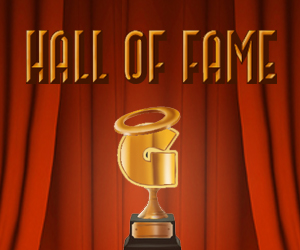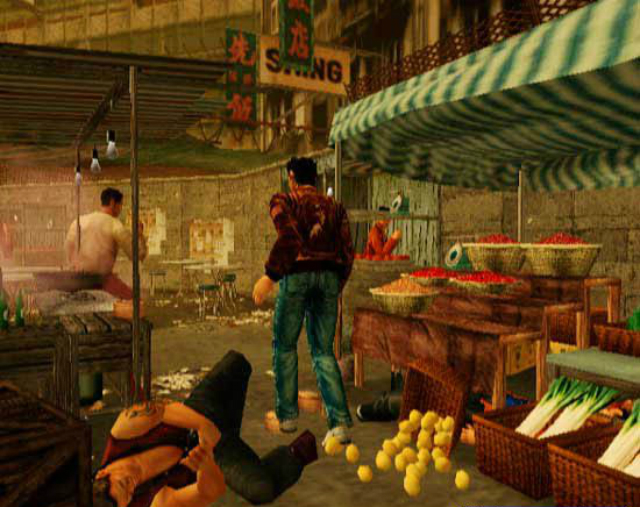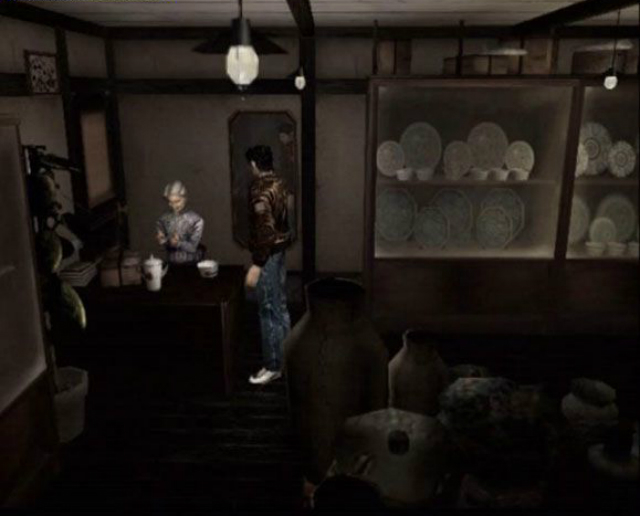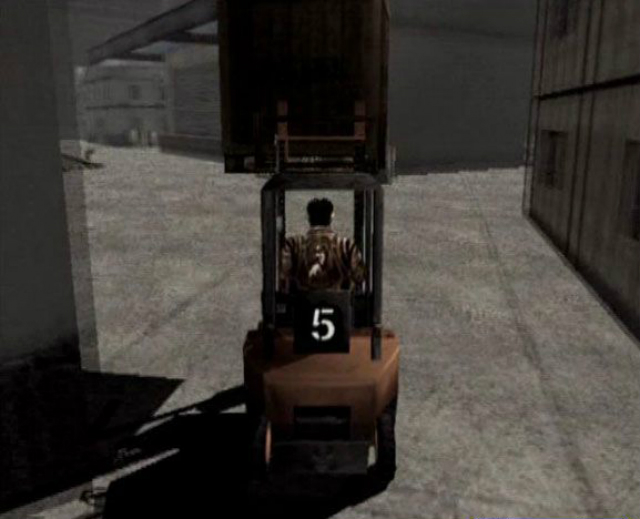Hall of Fame: Shenmue
 In this month’s Hall of Fame, we induct a gaming classic, one that people have been begging for a HD remake for the last couple of years now, a game that almost defined an entire console generation and was pretty much single-handedly the reason to buy one of SEGA’s ill-fated Dreamcasts. This month we’re inducting Shenmue into the GodisaGeek.com Hall of Fame.
In this month’s Hall of Fame, we induct a gaming classic, one that people have been begging for a HD remake for the last couple of years now, a game that almost defined an entire console generation and was pretty much single-handedly the reason to buy one of SEGA’s ill-fated Dreamcasts. This month we’re inducting Shenmue into the GodisaGeek.com Hall of Fame.
Ray talks about the effect that Shenmue had on his life.
Ray Willmott: Shenmue was a unique mix of genres when it first released back in 1999, and is considered by many to be the original open-world adventure. Ryo Hazuki’s journey is a long-road fondly remembered for its bare-knuckle kung-fu fighting, intricate storyline, living A.I. with their own daily schedules, real-time action requiring you to get a job, quick-time events and even some arcade favourites to pass the time.
For me, this was a special journey, and one that still holds a special place in my heart. I was quite a lonely kid growing up, dealing with bullying at school, and living in quite an isolated area. All I had were games, and it was Shenmue that really gave me purpose. Being able to delve into a living breathing virtual world was something I’d never had the opportunity to do before, and while it could never be a substitute for life, I lost hours of my life exploring and existing. At the time, it was the most personal videogame experience I’d ever had.

Shenmue helped define a new generation of games. It raised the bar for quality and proved that time and money spent can create something quite masterful. While Shenmue is conspicuous by its absence on this generation of systems, its legend lives on, as does its ever devoted fan-base.
Robin talks about Shenmue’s story, living, breathing environment, and looking for sailors.
Robin Parker: It is difficult to know where to start with Shenmue. Over the years, the game has achieved somewhat of a mystical status with some, and is a joke to others. Those who enjoyed the game back in the day will look back on it incredibly fondly for its scope, ambition and emotion. Others joke about the title because of its unfinished storyline (which is still waiting for a third instalment), its stilted speech and scripting, and the fact that you have to wander around looking for sailors.
The game mixed aspects of RPG levelling up and exploration with the Virtua Fighter combat engine. Add to that mix some early use of quick-time events and more obscure mini-games than you could shake a stick at, and the game offered a wide variety of gameplay elements. You even had to work for your money day to day, driving a fork-lift truck around the docks. To make the world even more real, the progression of time had to be managed, with days passing you by if you weren’t careful, and with it, changes in the weather. The game world was one of the first examples of a truly living, breathing environment. It really felt like you were a part of a sleepy Japanese village that had been shaken by the shock events of the intro.

Fuelled by revenge, we follow the story of the hero Ryo Hazuki, helping him in his quest to track down the man who killed his father and to reveal the secret behind a mysterious mirror held by his family. The story was truly epic, with many strong characters, both friends and foes, who you will encounter along the way. Added to that is a sweeping musical score, full of emotion and drama, which really adds to the atmosphere created in the game. The pacing of the game may have been slow, but the long build-up really allows for the game to build up anticipation and expectation, that something huge is going to happen, as evidenced by the climactic 70-man battle that is a real test of your endurance. That is how epic the title is, after surviving a battle against another 70 men, you really want to carry on the journey of Ryo into Shenmue 2 and beyond. I just hope that one day the story can be completed in one form or another.
Jonny talks about the experience of playing Shenmue when it was first released over playing it now, and the effect it has on people’s outlook on Japanese/Chinese culture.
Jonny Lewis: Shenmue was a masterpiece. People who haven’t played it, or have only played it recently will shrug it off, they may even call it overrated. Those people are wrong. You had to be there, man. You had to be there to play it when it came out. When it was truly cutting edge. Shenmue was a game that tore down barriers and gave us a living, breathing real-time world to explore like no one had seen before.
Taking on the role of Ryo Hazuki, a young man on a mission to get revenge on the man who killed your father, was a thrilling experience at the time. This game was incredibly deep, if you wanted information on your next task you probably had to talk to 20 people in and around the town to get the information you needed. Over the course of the game you got to know these characters, and they got to know you. Yes, it was all false, but I believed it. Even that crazy dancing hot dog selling Rasta bloke; I loved that guy!

To this day I don’t think I’ve played a game that generated the sense of atmosphere that Shenmue did. I could point you to several people that ended up having an interest in Japanese and Chinese culture just because of this game. You got a sense of what it was like to be in a quiet Japanese village, and how it must feel to explore a provincial Japanese port town. The game took place in the mid 80’s, a time when Japan was at a crossroads between Japanese traditionalism and Americanism, and you can see that transition in the game by looking at the old and the new.
Of course one of the most memorable parts of Shenmue was the voice acting. Most of the cast clearly couldn’t speak English, but that didn’t stop them. It made for some pretty hilarious moments, yet somehow didn’t detract from the overriding experience the game provides.
“I’m off to Dobuita now, gonna’ hit up The You Arcade and see if I can’t beat that Space Harrier score. You coming, BRO?”
Jason takes us down memory lane and talks about the intriguing characters, great storyline, and in game curfew that the first Shenmue had.
Jason Hendricks: What do you know about Sailors?? If you recognize this quote, you have played the incomparable Shenmue. I played this game to death when I first purchased it for the Dreamcast. It had intriguing characters, great storyline, and even an in game curfew! I had to finish my investigation before nightfall or grandma won’t give me my allowance. Ground-breaking to say the least.

You play the game as Ryo Hazuki in search of his father’s killer Lan Di. The game had a fully realized town with various areas and NPC’s that had actual personality. The dialogue may not hold up to today’s standards but at the time it was phenomenal. Shenmue was one of the first games I can remember to utilize quick time events for fighting and other tasks. Aside from the quick time event, there were all out brawls that functioned like a beat-’em-up. You had a standard repertoire of moves that could be upgraded by training; there was so much to do in such a lively town,people were gardening, enjoying sights, riding bikes, and even shopping. Being the first in a trilogy of games, the ending is a real cliffhanger.
SEGA made a real gem here, it’s a shame the game did not perform commercially as expected. I can still pick up this game today and play through. It gave a glimpse of the beauty of a Japanese town and culture. Shenmue had intrigue and mystery and, in my opinion, an even better sequel, but my heart is with its first instalment. It offers a mash-up of different genres and I commend the creator, Yu Suzuki for taking the risk. I feel it is also the predecessor to open world games such as Grand Theft Auto. To this day I’m hoping they round out the trilogy with the final game, but for now I will bask in the glory that is Shenmue.
The GodisaGeek Hall of Fame will return next month!




